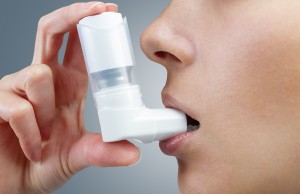Signs and Symptoms of Asthma
 Signs and Symptoms of Asthma
Signs and Symptoms of Asthma
Are you or a loved one living with asthma? Asthma is a chronic disease that impacts the lungs, causing inflammation and narrowing of your airways.
According to the National Heart, Lung, and Blood Institute, 25 million people currently living in the US have asthma; 7 million of which are children.
Just because asthma is a chronic disease, doesn’t mean asthma patients feel badly all of the time. Patients may experience periods without asthma attacks, especially once they understand their particular asthma triggers. With available treatment methods one can live a normal, active life with asthma. Read on to learn the basics about asthma, including asthma symptoms, causes and treatment options. Plus, when you should seek medical attention for an asthma flare up.
Common Asthma Symptoms
Asthma symptoms can be severe enough to interfere with your day-to-day life, or they can be more moderate and considered only an irritant. There are a few common symptoms those with asthma typically experience, these include:
Wheezing: an odd sound, like a whistling, when you breathe.
Coughing: especially at night or in the morning. The coughing may be bad enough to cause sleep difficulties.
Shortness of breath: the feeling that you can’t get enough air into your lungs.
The best way to know if you have asthma is to undergo a lung function test, which can be analyzed by a doctor alongside your overall health, lifestyle, and previous ailments.
What Happens During an Asthma Attack?
Your airways are literally tubes that allow air to flow in and out of your body. During an asthma attack these tubes become inflamed, meaning the passageways that let air in and out are narrowing. As your passages narrow your muscles contract, allowing less air to pass through. Airways can also produce excess mucus, leaving behind a sticky liquid that clogs airways further.
When caught early, asthma attacks often only require the use of asthma medication and symptoms dissipate on their own. In the case of a more severe asthma attack, emergency medical treatment might be necessary, as this can be life threatening.
What Causes Your Asthma?
Asthma symptoms are different in severity from person to person, just like the cause of asthma differs. Asthma can be inherited through your genetics, therefore if you have parents or other family members with asthma you are more likely to develop it.
If you are susceptible to asthma there are common triggers that will worsen symptoms, such as:
- In early childhood when the immune system is going through critical development, certain viral infections or airborne allergies can spark asthma.
- Allergens can include anything from dust, animal hair, pollen, molds, and cockroaches. In poor living conditions where bugs and rodents exist, childhood asthma is more likely to develop.
- Chemicals and other irritants found in the air like cigarette smoke and air pollution.
- Foods and drinks that contain sulfates.
- Respiratory infections (viral).
- Exercise and physical activity.
Adult Onset Asthma
Asthma is often diagnosed in childhood but there are cases of adult onset asthma as well. You can be 60, or even 80 years old and develop asthma for the first time in your life. Women are more likely to develop asthma as adults, along with people who are overweight.
Nearly, 50% of older adults that get asthma are allergic to something in their environment, which sparks the asthma. Younger adults are at a 30% risk for developing asthma due to allergies. Keep in mind that you can suddenly develop an allergy to something that has never bothered you before.
Illnesses, viruses, and infections all put you at a greater risk for asthma. Hormones can also play a role considering many women develop their first asthma symptoms during or after pregnancy. Interestingly, an ongoing Harvard Nurses Health Study reports women taking estrogen supplements for 10 years post-menopause are 50% more likely to develop asthma.
Smoking does not increase an adult’s risk for developing asthma, but it will worsen symptoms if you already have asthma.
How To Treat Asthma
If you have asthma it will be with you for life, thankfully there are things you can do to keep your symptoms under control.
- Keep constant contact with your doctors, and don’t take flare ups lightly.
- Avoid contracting other conditions that can worsen asthma symptoms.
- Uncover and then avoid your personal asthma triggers.
Asthma Medications
There are 2 types of medications for asthma. One provides long-term relief and is taken daily to manage symptoms and flare ups. The other type of asthma medication offers quick-relief and is only taken when you are experiencing an asthma attack.
Asthma symptoms and severity are known to change throughout life. Therefore, asthma medicine is often increased or reduced depending on your asthma triggers and how your asthma is currently reacting to your environment.
A doctor will help you to find your peak flow, which is the most air that moves in and out of your lungs at one time. To find your peak flow, you will blow into a device called a peak-flow-meter a few times each day over a 3-week period. After every reading you will record your score, checking at the end for your highest overall reading, which indicates your peak flow. This number serves as a comparison in the future to determine the state of your asthma.
Should You Visit Urgent Care Or The Emergency Room Regarding Asthma?
If you are experiencing blue fingernails, blue lips, difficulty walking and talking due to lack of breath, you will want to visit your local Emergency Room for asthma treatment.
For less severe asthma concerns you may visit your local Urgent Medical Center.

